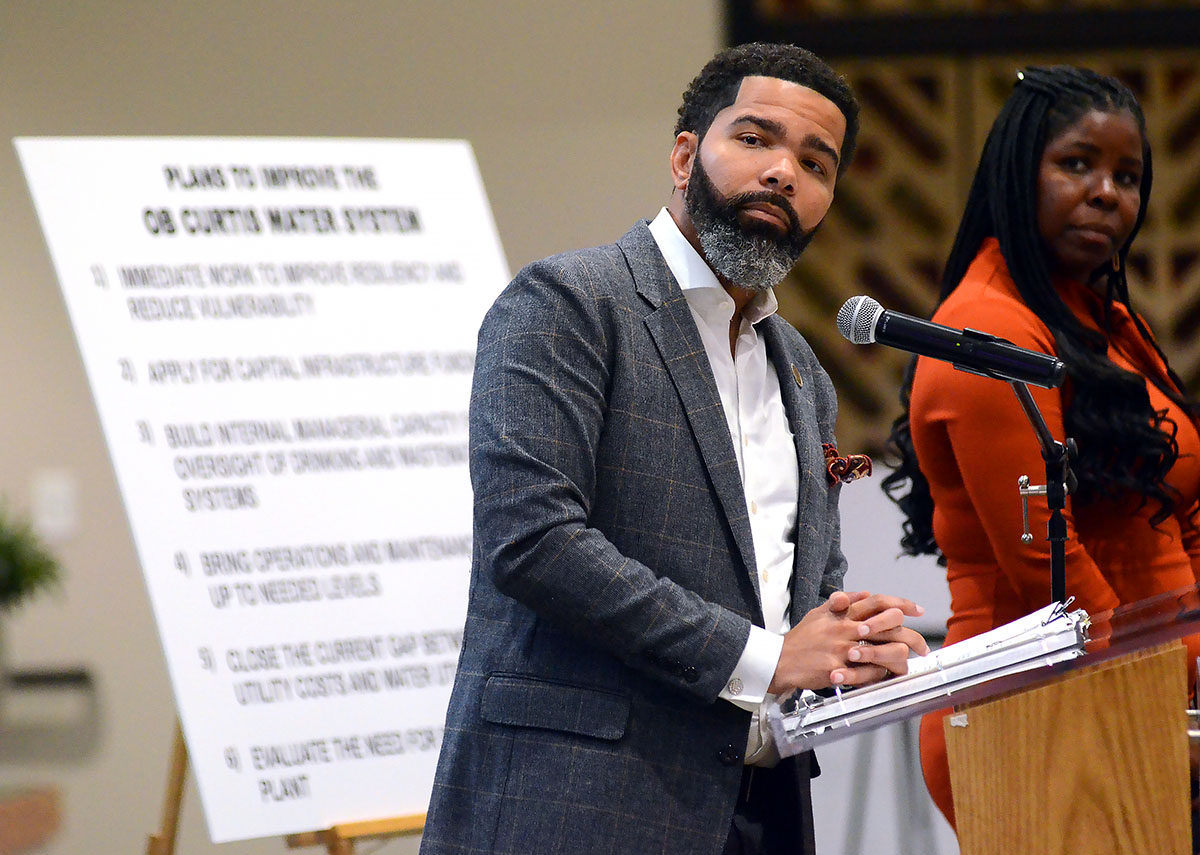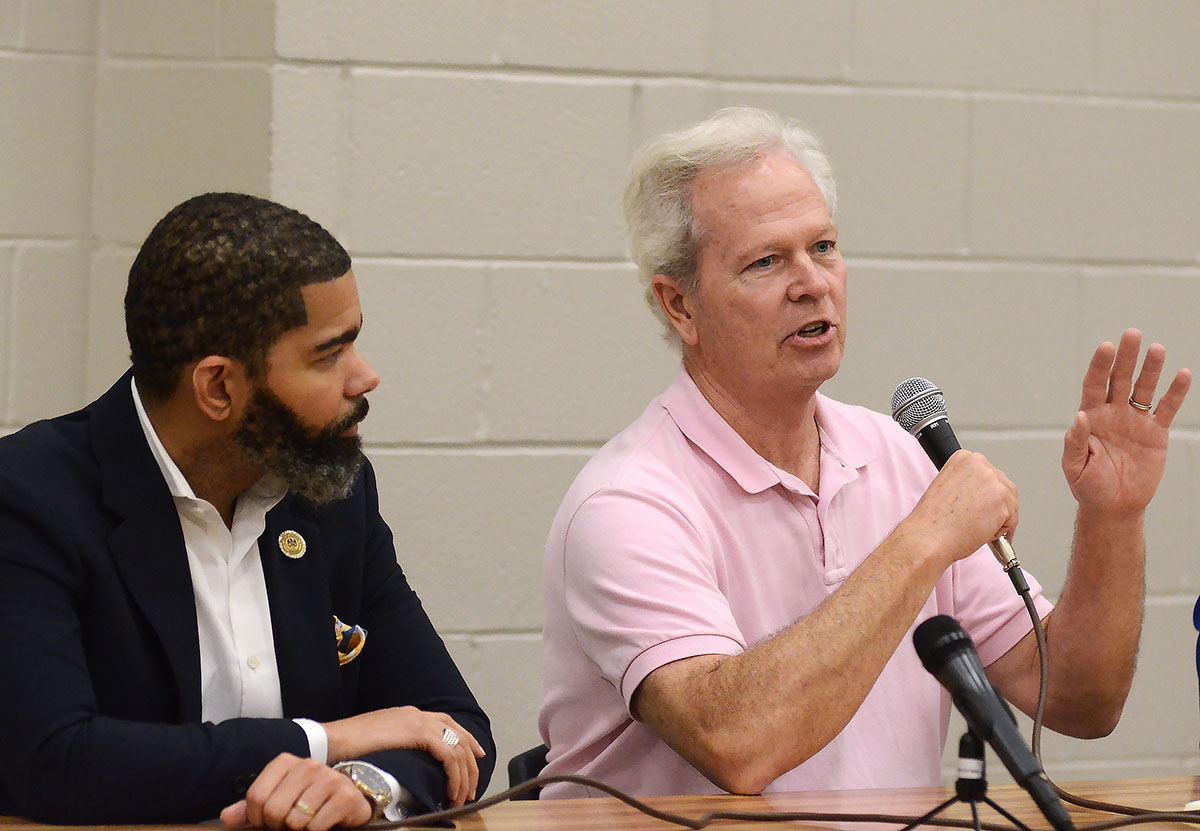Mississippi Today
Lumumba on bills aimed at Jackson: ‘It reminds me of apartheid’

Lumumba on bills aimed at Jackson: ‘It reminds me of apartheid’
Jackson Mayor Chokwe Antar Lumumba on Monday lambasted state lawmakers’ ongoing attempts to strong-arm city leadership through legislation that would remove local control over judicial and drinking water systems.
In the current legislative session, lawmakers have introduced the following bills:
- HB 1020, which would create a new court to oversee cases within Jackson’s Capital. Complex Improvement District with judges appointed by the state Supreme Court and prosecutors appointed by the state attorney general.
- HB 696, which would expand the boundaries of the the district.
- SB 2889, which would put the long-term control of Jackson’s drinking water system under a board mostly appointed by the governor and lieutenant governor.
- SB 2338, which would prevent cities from charging for water based on property value, a plan Jackson’s new third-party manager is proposing as a way to lower the cost burden on poorer residents.
The mayor spoke to the pattern of recent attempts to remove control over issues in Jackson from the 83% Black, majority Democrat city, and put it in the hands of state leaders; all of Mississippi’s statewide elected officials are white Republicans.
“It reminds me of apartheid,” Lumumba said Monday. “They are looking to colonize Jackson, not only in terms of them putting their military force over Jackson, but also dictating who has province over decision-making.
“They put this military force over us, and we’re just supposed to pay taxes to the king.”
Lumumba also called out HB 370, which would allow voters to recall municipal elected officials. Critics of the bill argue it was aimed at removing Jackson leadership, although the bill’s author, Rep. Shanda Yates, said she didn’t introduce it with the city in mind.
The mayor has frequently criticized the role of state leaders over the past year. Last April, Lumumba called the Legislature “paternalistic” and “racist” after a dispute over the appropriation of federal funds from the American Rescue Plan Act. In their handling of the funds, lawmakers attached extra oversight over Jackson’s spending of infrastructure money that wasn’t required for other cities in the state.
Last fall, after a combination of flooding and broken pumps shut down the capital city’s drinking water system, Gov. Tate Reeves announced that the state was taking over Jackson’s water operations. After both initially said that the city and state were working together, Reeves and Lumumba spent weeks launching public attacks against each other.
Following the U.S. Department of Justice’s November order to put the water system into the hands of a third-party manager, Reeves said it was “excellent news” that Lumumba would no longer have authority over the utility.

The federal government recently appropriated $600 million to directly assist Jackson’s water system; that money is part of a total $814 million in federal funds that will go towards the city’s water and sewer projects.
Lumumba said Monday there has never been an investment like this before, referencing that Flint received $100 million in federal funds to aid its lead crisis. He said Lt. Gov. Delbert Hosemann expressed doubts that Jackson could secure such funding without the state’s help.
“(Hosemann) said that I needed to look at a possible relationship with the state, because what did I think, Biden was going to write me a check?” Lumumba said. “I recently told (Hosemann): ‘I do, and he did it.'”

Mayor hasn’t seen proposal yet, appointing new public works director
Asked about last week’s proposal from the city’s new water manager, Ted Henifin, Lumumba said he hasn’t yet reviewed the plan, and couldn’t speak to specific ideas in the plan, such as charging customers based on property values or creating a nonprofit to govern the system long term.
Lumumba did say the city was getting ready to announce a new interim public works director; the previous interim director, Jordan Hillman, is now working for Henifin’s organization, JXN Water.
The mayor said the city is hiring a recruiting firm to find a permanent director, and added that the new director will no longer be handling the city’s drinking water.
Asked if management of the drinking water system would remain with a separate entity long-term, Lumumba said “it’s too early to say.”
“I will say my interest is not just to run (the water system) and operate it for the sake of running and operating it,” the mayor said.
Lumumba will host a town hall to discuss the latest around federal funding and Henifin’s role on Wednesday at 6 p.m. at Forest Hill High School.
This article first appeared on Mississippi Today and is republished here under a Creative Commons license.
Mississippi Today
1964: Mississippi Freedom Democratic Party was formed
April 26, 1964

Civil rights activists started the Mississippi Freedom Democratic Party to challenge the state’s all-white regular delegation to the Democratic National Convention.
The regulars had already adopted this resolution: “We oppose, condemn and deplore the Civil Rights Act of 1964 … We believe in separation of the races in all phases of our society. It is our belief that the separation of the races is necessary for the peace and tranquility of all the people of Mississippi, and the continuing good relationship which has existed over the years.”
In reality, Black Mississippians had been victims of intimidation, harassment and violence for daring to try and vote as well as laws passed to disenfranchise them. As a result, by 1964, only 6% of Black Mississippians were permitted to vote. A year earlier, activists had run a mock election in which thousands of Black Mississippians showed they would vote if given an opportunity.
In August 1964, the Freedom Party decided to challenge the all-white delegation, saying they had been illegally elected in a segregated process and had no intention of supporting President Lyndon B. Johnson in the November election.
The prediction proved true, with white Mississippi Democrats overwhelmingly supporting Republican candidate Barry Goldwater, who opposed the Civil Rights Act. While the activists fell short of replacing the regulars, their courageous stand led to changes in both parties.
This article first appeared on Mississippi Today and is republished here under a Creative Commons Attribution-NoDerivatives 4.0 International License.![]()
Mississippi Today
Mississippi River flooding Vicksburg, expected to crest on Monday
Warren County Emergency Management Director John Elfer said Friday floodwaters from the Mississippi River, which have reached homes in and around Vicksburg, will likely persist until early May. Elfer estimated there areabout 15 to 20 roads underwater in the area.
“We’re about half a foot (on the river gauge) from a major flood,” he said. “But we don’t think it’s going to be like in 2011, so we can kind of manage this.”
The National Weather projects the river to crest at 49.5 feet on Monday, making it the highest peak at the Vicksburg gauge since 2020. Elfer said some residents in north Vicksburg — including at the Ford Subdivision as well as near Chickasaw Road and Hutson Street — are having to take boats to get home, adding that those who live on the unprotected side of the levee are generally prepared for flooding.



“There are a few (inundated homes), but we’ve mitigated a lot of them,” he said. “Some of the structures have been torn down or raised. There are a few people that still live on the wet side of the levee, but they kind of know what to expect. So we’re not too concerned with that.”
The river first reached flood stage in the city — 43 feet — on April 14. State officials closed Highway 465, which connects the Eagle Lake community just north of Vicksburg to Highway 61, last Friday.

Elfer said the areas impacted are mostly residential and he didn’t believe any businesses have been affected, emphasizing that downtown Vicksburg is still safe for visitors. He said Warren County has worked with the U.S. Army Corps of Engineers and the Mississippi Emergency Management Agency to secure pumps and barriers.
“Everybody thus far has been very cooperative,” he said. “We continue to tell people stay out of the flood areas, don’t drive around barricades and don’t drive around road close signs. Not only is it illegal, it’s dangerous.”
NWS projects the river to stay at flood stage in Vicksburg until May 6. The river reached its record crest of 57.1 feet in 2011.




This article first appeared on Mississippi Today and is republished here under a Creative Commons Attribution-NoDerivatives 4.0 International License.![]()
Mississippi Today
With domestic violence law, victims ‘will be a number with a purpose,’ mother says
Joslin Napier. Carlos Collins. Bailey Mae Reed.
They are among Mississippi domestic violence homicide victims whose family members carried their photos as the governor signed a bill that will establish a board to study such deaths and how to prevent them.
Tara Gandy, who lost her daughter Napier in Waynesboro in 2022, said it’s a moment she plans to tell her 5-year-old grandson about when he is old enough. Napier’s presence, in spirit, at the bill signing can be another way for her grandson to feel proud of his mother.
“(The board) will allow for my daughter and those who have already lost their lives to domestic violence … to no longer be just a number,” Gandy said. “They will be a number with a purpose.”
Family members at the April 15 private bill signing included Ashla Hudson, whose son Collins, died last year in Jackson. Grandparents Mary and Charles Reed and brother Colby Kernell attended the event in honor of Bailey Mae Reed, who died in Oxford in 2023.
Joining them were staff and board members from the Mississippi Coalition Against Domestic Violence, the statewide group that supports shelters and advocated for the passage of Senate Bill 2886 to form a Domestic Violence Facility Review Board.
The law will go into effect July 1, and the coalition hopes to partner with elected officials who will make recommendations for members to serve on the board. The coalition wants to see appointees who have frontline experience with domestic violence survivors, said Luis Montgomery, public policy specialist for the coalition.
A spokesperson from Gov. Tate Reeves’ office did not respond to a request for comment Friday.
Establishment of the board would make Mississippi the 45th state to review domestic violence fatalities.
Montgomery has worked on passing a review board bill since December 2023. After an unsuccessful effort in 2024, the coalition worked to build support and educate people about the need for such a board.
In the recent legislative session, there were House and Senate versions of the bill that unanimously passed their respective chambers. Authors of the bills are from both political parties.
The review board is tasked with reviewing a variety of documents to learn about the lead up and circumstances in which people died in domestic violence-related fatalities, near fatalities and suicides – records that can include police records, court documents, medical records and more.
From each review, trends will emerge and that information can be used for the board to make recommendations to lawmakers about how to prevent domestic violence deaths.
“This is coming at a really great time because we can really get proactive,” Montgomery said.
Without a board and data collection, advocates say it is difficult to know how many people have died or been injured in domestic-violence related incidents.
A Mississippi Today analysis found at least 300 people, including victims, abusers and collateral victims, died from domestic violence between 2020 and 2024. That analysis came from reviewing local news stories, the Gun Violence Archive, the National Gun Violence Memorial, law enforcement reports and court documents.
Some recent cases the board could review are the deaths of Collins, Napier and Reed.
In court records, prosecutors wrote that Napier, 24, faced increased violence after ending a relationship with Chance Fabian Jones. She took action, including purchasing a firearm and filing for a protective order against Jones.
Jones’s trial is set for May 12 in Wayne County. His indictment for capital murder came on the first anniversary of her death, according to court records.
Collins, 25, worked as a nurse and was from Yazoo City. His ex-boyfriend Marcus Johnson has been indicted for capital murder and shooting into Collins’ apartment. Family members say Collins had filed several restraining orders against Johnson.
Johnson was denied bond and remains in jail. His trial is scheduled for July 28 in Hinds County.
He was a Jackson police officer for eight months in 2013. Johnson was separated from the department pending disciplinary action leading up to immediate termination, but he resigned before he was fired, Jackson police confirmed to local media.
Reed, 21, was born and raised in Michigan and moved to Water Valley to live with her grandparents and help care for her cousin, according to her obituary.
Kylan Jacques Phillips was charged with first degree murder for beating Reed, according to court records. In February, the court ordered him to undergo a mental evaluation to determine if he is competent to stand trial, according to court documents.
At the bill signing, Gandy said it was bittersweet and an honor to meet the families of other domestic violence homicide victims.
“We were there knowing we are not alone, we can travel this road together and hopefully find ways to prevent and bring more awareness about domestic violence,” she said.
This article first appeared on Mississippi Today and is republished here under a Creative Commons Attribution-NoDerivatives 4.0 International License.
-

 News from the South - Florida News Feed6 days ago
News from the South - Florida News Feed6 days agoJim talks with Rep. Robert Andrade about his investigation into the Hope Florida Foundation
-

 News from the South - Alabama News Feed5 days ago
News from the South - Alabama News Feed5 days agoPrayer Vigil Held for Ronald Dumas Jr., Family Continues to Pray for His Return | April 21, 2025 | N
-

 Mississippi Today5 days ago
Mississippi Today5 days ago‘Trainwreck on the horizon’: The costly pains of Mississippi’s small water and sewer systems
-

 News from the South - Texas News Feed5 days ago
News from the South - Texas News Feed5 days agoMeteorologist Chita Craft is tracking a Severe Thunderstorm Warning that's in effect now
-

 News from the South - Florida News Feed4 days ago
News from the South - Florida News Feed4 days agoTrump touts manufacturing while undercutting state efforts to help factories
-

 News from the South - Virginia News Feed5 days ago
News from the South - Virginia News Feed5 days agoTaking video of military bases using drones could be outlawed | Virginia
-

 News from the South - Texas News Feed7 days ago
News from the South - Texas News Feed7 days agoNo. 3 Texas walks off No. 9 LSU again to capture crucial SEC softball series
-

 News from the South - Arkansas News Feed6 days ago
News from the South - Arkansas News Feed6 days agoAs country grows more polarized, America needs unity, the ‘Oklahoma Standard,’ Bill Clinton says














































